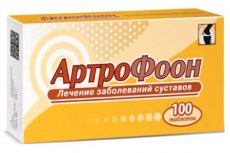新出版物
Arthrophon
最近審查:04.07.2025

Arthrofoon是一种生物制剂,由针对人类肿瘤坏死因子α (TNF-α) 的抗体组成,经亲和力独家纯化。TNF-α是一种抗炎细胞因子,在免疫系统中发挥重要作用,尤其是在炎症和免疫反应中。
Arthrofoon 用于治疗各种与炎症相关的疾病,例如类风湿性关节炎、克罗恩病和牛皮癣。TNF-α 抗体有助于减轻炎症并减缓这些疾病的进展。
“亲和力纯化”意味着该药物仅含有特异性结合TNF-α的抗体,并且已从其他成分中纯化,从而提高了其有效性并降低了副作用的可能性。
適應症 Arthrofoona
- 类风湿性关节炎:这种药物可用于治疗类风湿性关节炎,这是一种导致关节炎症的自身免疫性疾病。
- 克罗恩氏病:Arthrofoon 可用于治疗克罗恩氏病,这是一种胃肠道慢性炎症疾病。
- 银屑病关节炎:用于治疗银屑病的关节表现,也是一种自身免疫性疾病。
- 强直性脊柱炎:这种脊柱关节的炎症性疾病也可能需要使用 artrofon。
- 牛皮癣:适用于严重形式的牛皮癣,尤其是当关节受到影响时。
發布表單
Arthrofon 通常以注射剂形式提供。该溶液可能以安瓿瓶或小瓶形式提供,其中含有一定量的注射药物。通常用于皮下注射或静脉注射,具体取决于药物种类和医生的建议。
藥效學
Artrofon的药效学与其对人类肿瘤坏死因子α (TNF-α) 的作用有关。TNF-α是一种在炎症和免疫反应中发挥关键作用的细胞因子。TNF-α过量产生可导致各种炎症和自身免疫性疾病。
Artrofon 是一种单克隆抗体,可特异性结合 TNF-α,阻断其生物活性。这可以减少炎症过程,并减轻类风湿性关节炎、克罗恩病、牛皮癣等疾病的临床症状。
Artrofon 的作用旨在减少炎症和防止关节破坏,从而改善慢性炎症疾病患者的生活质量。
藥代動力學
- 吸收:由于artrophon通常通过注射进入体内,因此它通常会从注射部位迅速而完全地吸收。
- 分布:Arthrophon通过血液循环分布于体内。它可以渗透到许多组织和器官,包括关节,这对于其在治疗炎症性关节疾病方面的作用尤为重要。
- 代谢:像artrophon这样的单克隆抗体通常不会按照传统方式代谢。它们作用于靶分子后可能会降解并从体内消除。
- 排泄:Artrofon可能通过肾脏和/或胆汁排出体外。排泄速度可能因患者个体情况、健康状况和肾功能而异。
劑量和管理
- 使用方法:Artrofon 通常通过静脉或皮下注射给药。注射通常由诊所或医院的医疗保健专业人员进行。
- 剂量:剂量可能因疾病和患者特征而异。通常情况下,artrofon 的剂量为每周 3 至 10 毫克/千克。然而,推荐剂量可能会根据治疗反应和可能的副作用进行调整。
- 分剂量:有时可以将剂量分成每周几次注射以达到最佳效果。
- 治疗持续时间:artrofon 的治疗持续时间也可能因疾病性质和治疗反应而异。通常,治疗需要数月甚至数年。
在懷孕期間使用 Arthrofoona
怀孕期间使用 artrofon 应在严格的医疗监督下进行,并且只有在有严格指征、对母亲的益处大于对胎儿的潜在风险时才可使用。
目前,关于孕期使用Artrophon的安全性数据有限,其对胎儿发育的影响尚未得到充分研究。Artrophon作为单克隆抗体,通常不会穿过胎盘屏障,但这并不排除其对胎儿发育可能产生的影响。
在决定在怀孕期间使用阿特罗芬之前,务必对每个病例进行全面的风险收益评估。医生应考虑母亲的健康状况、病情严重程度、替代治疗方法以及对胎儿的潜在风险。
禁忌
- 个体不耐受或过敏反应:已知对artrofon或其他含有单克隆抗体的药物成分过敏的人应避免使用。
- 严重感染:由于阿特罗芬会影响免疫系统,使用阿特罗芬可能会加重感染。因此,对于活动性严重感染,阿特罗芬可能禁用。
- 与活疫苗同时使用:由于阿曲芬(artrofon)对免疫系统有影响,可能会降低活疫苗的有效性。因此,如果必须接种活疫苗,则可能禁用阿曲芬。
- 严重的肝脏或肾脏功能障碍:由于药物可能在体内蓄积,严重肝脏或肾脏功能障碍患者使用artrofon可能会受到限制。
- 怀孕和哺乳:由于缺乏关于该药物在这些时期的安全性数据,因此在怀孕和哺乳期间使用 artrofon 可能是禁忌的。
副作用 Arthrofoona
- 感染:由于阿特罗芬会影响免疫系统,因此发生感染(包括呼吸道和泌尿道感染)的风险会增加。
- 注射部位反应:Artrofon 注射部位可能会出现发红、疼痛、肿胀或瘙痒。
- 过敏反应:包括荨麻疹、呼吸困难、嘴唇或面部肿胀以及过敏性休克。
- 肝毒性:可能会出现肝毒性,包括肝酶升高和黄疸。
- 出血性疾病:Artrofon 可能会增加出血风险,包括胃肠道出血或瘀斑。
- 神经系统疾病:可能包括头痛、周围神经病变等。
- 心血管并发症:可能出现高血压或心力衰竭等心血管并发症。
- 白细胞减少症和血小板减少症:一些患者可能会出现血液中白细胞或血小板数量减少。
過量
- 感染风险增加:由于免疫系统受到过度抑制,可能会增加感染的可能性。
- 过敏反应增加:可能出现荨麻疹、瘙痒、肿胀或过敏性休克等过敏反应增加。
- 肝脏或肾脏毒性:较高剂量的 artrofon 可能会增加肝脏或肾脏毒性的风险。
- 出血性疾病:增加剂量可能会增加出血风险,因为 artrofon 可能会影响血小板功能。
- 其他副作用:可能包括头痛、恶心、腹泻、高血压等。
與其他藥物的相互作用
- 抑制免疫系统的药物:artrofon 与其他免疫抑制药物(如甲氨蝶呤或环孢菌素)同时使用可能会增加感染和其他副作用的风险。
- 增加出血风险的药物:当同时使用artrofon与抗凝剂或抗血小板剂时,出血风险可能会增加。
- 抗结核药物:TNF-α抑制剂可能会降低抗结核治疗的有效性。因此,接受抗结核药物治疗的患者可能需要定期监测健康状况并根据需要调整治疗方案。
- 疫苗:使用 artrophon 可能会降低疫苗(尤其是活疫苗)的有效性,因此可能需要暂时中断治疗或调整疫苗接种时间表。
- 增加肝脏或肾脏毒性风险的药物:同时使用 artrofon 与可能增加肝脏或肾脏毒性的药物可能会增加副作用的风险。
儲存條件
- 储存温度:Artrofon 通常储存在 2 至 8 摄氏度的冰箱中。这有助于防止药物分解并保持其活性。
- 防冻保护:避免 Artrophon 冻结非常重要,因此应将其存放在冰箱中,但不要放在冷冻的表面上。
- 避光:直射光会对生物制品的稳定性产生负面影响,因此artrofon通常采用深色容器包装,或采用特殊的保护壳包装。
- 遵守有效期:必须监控 Artrofon 的有效期,并且不要在有效期后使用该药物。
- 请将本品放在儿童不能接触的地方:与任何药物一样,应将 artrofon 放在儿童不能接触的地方,以免意外吞食。
注意!
為了簡化對信息的理解,本指令使用了藥物 "Arthrophon",並根據藥物的醫療用途官方說明。 使用前請閱讀直接用於藥物的註釋。
描述僅供參考,不適用於自我修復指導。 這種藥物的需求,治療方案的目的,藥物的方法和劑量僅由主治醫師確定。 自我藥療對你的健康有危害。

